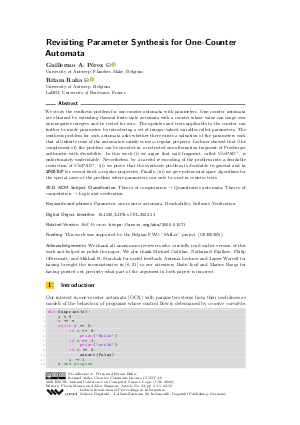@InProceedings{perez_et_al:LIPIcs.CSL.2022.33,
author = {P\'{e}rez, Guillermo A. and Raha, Ritam},
title = {{Revisiting Parameter Synthesis for One-Counter Automata}},
booktitle = {30th EACSL Annual Conference on Computer Science Logic (CSL 2022)},
pages = {33:1--33:18},
series = {Leibniz International Proceedings in Informatics (LIPIcs)},
ISBN = {978-3-95977-218-1},
ISSN = {1868-8969},
year = {2022},
volume = {216},
editor = {Manea, Florin and Simpson, Alex},
publisher = {Schloss Dagstuhl -- Leibniz-Zentrum f{\"u}r Informatik},
address = {Dagstuhl, Germany},
URL = {https://drops.dagstuhl.de/entities/document/10.4230/LIPIcs.CSL.2022.33},
URN = {urn:nbn:de:0030-drops-157534},
doi = {10.4230/LIPIcs.CSL.2022.33},
annote = {Keywords: Parametric one-counter automata, Reachability, Software Verification}
}

 Creative Commons Attribution 4.0 International license
Creative Commons Attribution 4.0 International license










